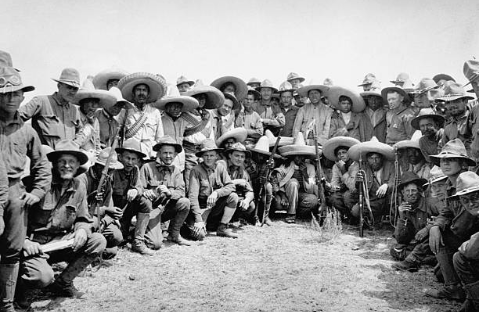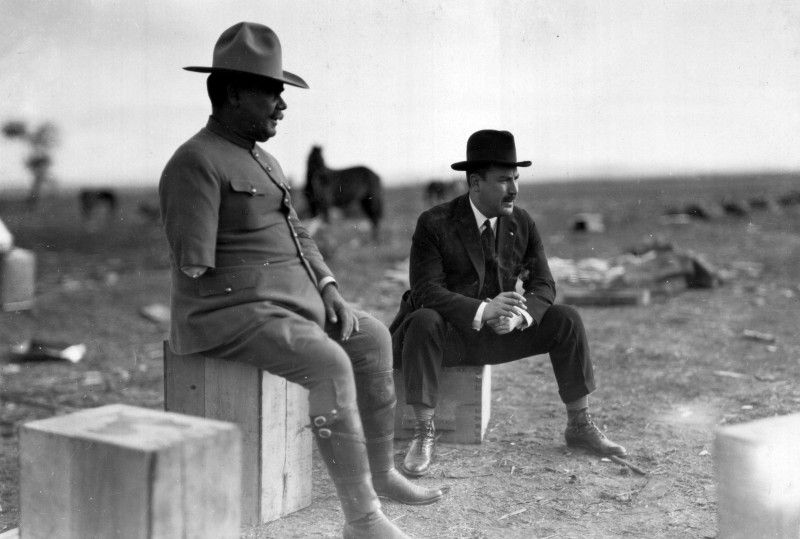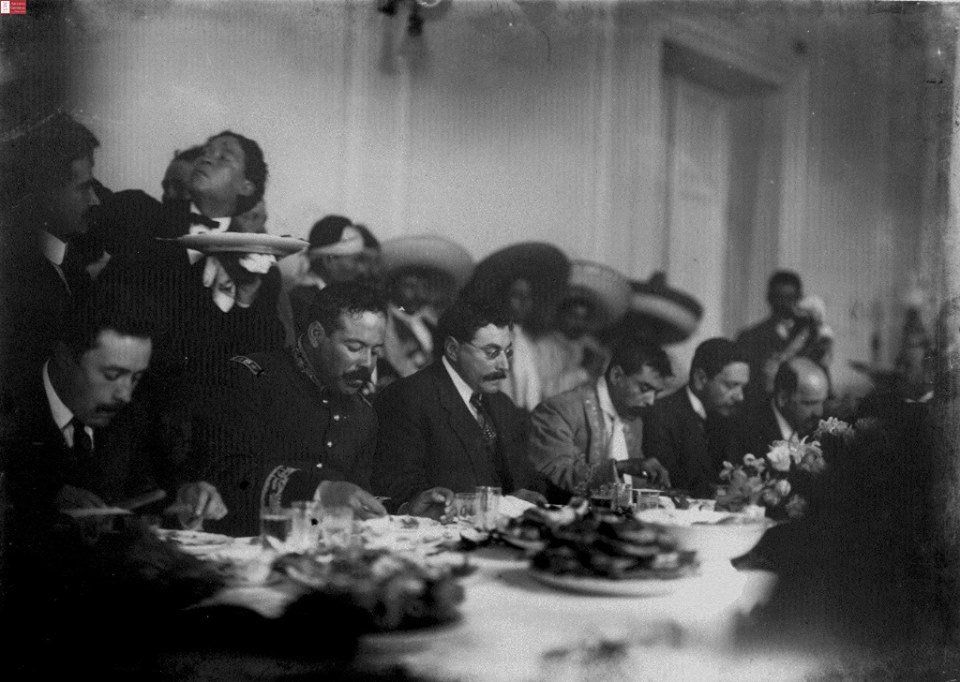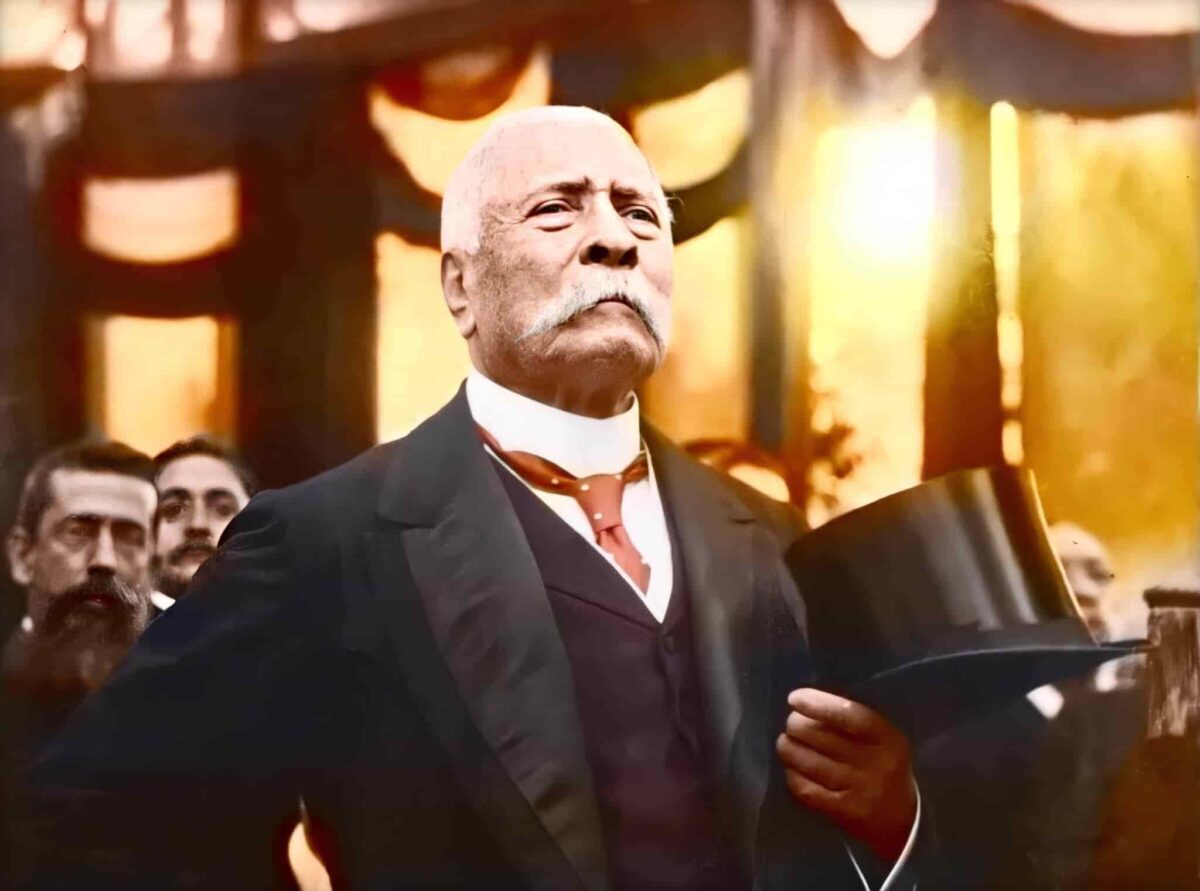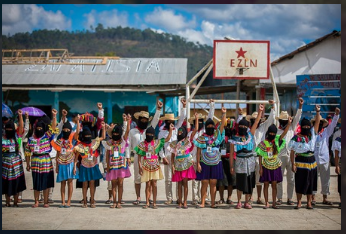While the Mexican Revolutionaries fought for the land, the Great Powers tried to pick the winner. Germany and Britain, Japan and of course the US, all schemed and intrigued. We talk about the Kaiser’s offer of Arizona, Texas, and New Mexico to Carranza and why Carranza didn’t want them; why Japan thought German proposals “simply insane”; why Britain mostly just wanted the oil; and how Wilson’s sending Pershing in to catch Pancho Villa led to Pancho Villa’s force growing from 500 to 10,000 men. The short coda to end our series on the Mexican Revolution.
Category: Chiapas and Zapatistas
Articles about the Zapatistas in Chiapas and their ideas of reciprocal solidarity
The Mexican Revolution pt3: The Downfall
Obregon defeats Zapata and Villa in battle. Carranza betrays the workers’ unions. The Morelos commune lives on, though its leaders fall one by one until Zapata himself. Villa too. And Obregon. And Carranza. We ask, what was it all for? And we give you the answers of some historians of the revolution: it was not in vain!
Mexican Revolution pt2: Villa and Zapata take Mexico City
Porfirio is out, Madero is in, but he has the same problem: how to stop the invincible peasant revolution now in motion? And the answer is, he can’t! Pancho Villa and Emiliano Zapata take the capital, but the seeds of their downfall and of their glorious peasant revolution are already laid. Part 2 of our miniseries on the Mexican Revolution.
The Mexican Revolution pt1: The end of the Porfiriato
The Mexican Revolution was an extraordinary event in 20th century history. In part 1 of our miniseries on the revolution we give the background from the Mexican-American war to the end of the quarter decade of Porfirio Diaz. The class balance of forces leading to the revolution and the dramatic events. We also talk about the main book Justin is using, Adolfo Gilly’s La Revolucion Interrumpida, written by an Argentinian-Mexican revolutionary in a Mexican prison! The intro and outro music for this episode is the Mexican Revolutionary song, La Cucaracha, performed by the Castilians. Listen to it at archive.org: https://archive.org/details/78_la-cucaracha-the-mexican-cockroach-song_the-castilians-stanley-adams_gbia0004379
AEP 66: Lopez Obrador takes on the Zapatistas
In Chiapas, Mexico, the Indigenous Zapatista rebels have raised the alarm about an intensification of paramilitary attacks on their communities. Manuel Rozental and I are joined by author John Gibler to talk about Mexican politics and how it is that a Mexican government led by a leftist president continues the historical pattern of dirty war against the Indigenous movement.
A massacre in the NAFTA zone
Written for Ricochet Media
A national day of action in protest against the disappearance and massacre of 43 education students in Mexico occurred on Wednesday, Oct. 8. The national teachers’ union made the call to protest, which was answered in 59 cities in Mexico and included a silent march organized by the Zapatistas in San Cristóbal de las Casas. Protests occurred all over the world, including Canada.
The college students from the Mexican community of Ayotzinapa in the state of Guerrero, 43 of whom were disappeared from a bus on Sept. 26, were studying to be teachers and protesting the starvation of the public system they were planning to work in. The bus was ambushed by police, probably on orders from officials in the nearby city of Iguala, Guerrero, from the director of Seguridad Publica (Public Security), Francisco Salgado Valladeres, and the mayor, José Luis Abarca. Both of these men are currently on the run. Six people were killed in the ambush, among them people on an unrelated bus, which was mistaken for a bus with student protesters and was actually carrying a soccer team.
An unknown number of bodies, 34 at last count, almost certainly belonging to these students, were unearthed in a mass grave in Iguala. The bodies had signs of torture and were probably burned alive.
Randal Archibold, writing in the New York Times, put forward the theory that the police were a part of a gang, or passed the kidnapped students on to a gang, which was strange because the students “were not known to have criminal ties.”
Canadian journalist and author Dawn Paley, currently studying in Mexico, writes, “The killers in Iguala were not drug gangs. They were cops and paramilitaries. Paramilitaries are non-state armed groups who work with state forces. There can be no clearer example of the horrors of state and paramilitary violence than what has happened to these students.” This massacre, Paley notes, is far from the only mass grave in Mexico. The New York Times report went so far as to say the country was “accustomed to mass killings.”
the key context for these killings is the use of state violence, up to mass murder, to manage social protest and to dismantle the public sphere
All of these issues are linked — drugs, crime, corruption and politics — but the key context for these killings is the use of state violence, up to mass murder, to manage social protest and to dismantle the public sphere. In this case, the attack focused on an embattled network of rural teacher education that has survived only through student mobilization, that seeks to serve Mexico’s rural population of 28 million, 20 million of whom live in extreme poverty.
The first escuelas normales were established in Mexico in the 1920s. They were a part of the country’s distant revolutionary history, where the goal was to bring public education to Mexico’s countryside and to create schools that would educate teachers and rural leaders among Mexico’s peasants. They were explicitly based on inculcating values of democracy and self-governance.
Historian Tanalis Padilla has described a pattern of violence against normalistas over many decades in La Jornada, concluding that “the lives of normalistas seem to have little value.”
The state and police certainly have acted that way. Unless people in Mexico and their friends outside, including here in Canada, prove them wrong, we can expect more Ayotzinapas.
Reading from and a review of The Demands of the Dead, Oct 10, 12pm, Toronto Public Library
I will be reading from the Demands of the Dead on Friday Oct 10, 12pm, at the Toronto Public Library. If you’re in the city, come and check it out.
I also wanted to call attention to the review of the book by Megan Cotton-Kinch at the Two Row Times, which was also republished at Countercurrents.org.
Here’s the event listing:
The Demands of the Dead: A crime novel by Justin Podur
Fri Oct 10, 2014
12:00 p.m. – 1:15 p.m.
75 mins
Toronto Reference Library, Elizabeth Beeton Auditorium
Here’s Megan Cotton-Kinch’s review:
Book review: A detective story set in the middle of an Indigenous insurgency
Demands of the Dead, By Justin Podur
Reviewed by Megan Cotton-Kinch
While I’ve always enjoyed a good detective novel, I’ve always felt like this genre usually contains an underlying message of support for the police, and never really takes a critical look at the role of “law-and-order” in maintaining a society based on the oppression of poor people and the theft of Indigenous land. At best, this kind of stories will look at corruption in police and politics but offer no solutions. This is where Demands of the Dead transcends the genre, and moves beyond works like The Wire by actually looking at the larger political context and offering possible solutions. In the case of Podur’s novel these are represented by the Zapatista Indigenous insurgency, which has an important presence in the book.
In the opening of Demands of the Dead, an ex-cop receives an email, in Spanish that says, “The dead demand so much more than vengeance.” But the dead are more than the two dead police, or his dead friend, but include all the dead in southern Mexico who have been killed in the counter-insurgency. And unlike most books in the detective genre the novel does offer up the possibility of solutions that go beyond personal vengeance.
Did Zapatista guerrillas murder two police officers? Or was it the Mexican police? Or drug traffickers? What were the police, in the political context of an armed uprising, doing on Zapatista territory anyway? The main character “Mark” is in southern Mexico to investigate. But in reality he is there to investigate the murder of his best friend, a progressive lawyer and activist, back in New York, by cops on the force he used to serve on.
The novel, and its protagonist “Mark”, doesn’t shrink from looking at what it means to be an ex-cop, and ‘independent’ contractor working with semi-sponsorship from the American embassy and their proxies in the Mexican counter insurgency (police and military). Back in the States, Mark’s murdered best friend had told him, “You can’t help. You should just go. I don’t care what kind of person you are Mark. If you’re a cop, we’re enemies.” But Mark is not just an ex-cop, he also has wilderness survival and tracking skills, and a personal history that gives him connections to progressive lawyers and an inclination to cross into Zapatista territory to get their side of the story.
As asides into the two cases, one official and one personal, there are discussions of Zapatista political and military strategy, with people’s organizations and democratic decision-making as preferred weapons in a struggle, but with an armed self-defense strategy in reserve. Podur also shows what they are up against: a counter-insurgency strategy targeted at the Indigenous Zapatistia movement that is linked with machine politics, American imperialism and drug money.
Nonetheless, the novel has a very nuanced take on the state and police systems, seeing them worthy of analysis and full of contradictions.
The book has realistic fight scenes with descriptions to suit martial arts fans, and accurate descriptions of guns and military tactics. The main character’s wilderness skills are not overplayed but are realistic assessments of the kind of things that skilled trackers can do (hear people approach before they arrive due to concentric disturbances in the forest) and can’t do (find individual tracks of intruders on a heavily trafficked roadway). The one thing I’d wish for is more fully developed female characters with plot importance.
The author, Justin Podur, is better known as a non-fiction writer and commentator on political topics, including Indigenous issues and solidarity efforts with Palestine. He is a professor at York University who does research on forestry and forest fires. In the novel, this background is present but doesn’t overwhelm the story.
The novel is available for download or purchase as a book from Justin’s website http://podur.org/demandsofthedead
Updating my archives – Palestine 2002, Chiapas 2000
I have been updating my Writings Archive (see the tab above) and making sure that all of the links are working, putting copies of the material published elsewhere into this blog so it’s all searchable and such. Part of this is re-posting work that hasn’t been on the internet in a long time, so it’s been interesting memories.
One of the most was this photo essay from Palestine in the summer of 2002, 10 years ago now.
Another is Continue reading “Updating my archives – Palestine 2002, Chiapas 2000”
The Sup on Palestine
Whatever the value of this path that I’m on, wherever it leads, Subcomandante Marcos’s words were a major part of putting me on it. The Chiapas of the Zapatistas is one of the first places I visited and reported from and worked in and it was not that long a two years from Chiapas to Palestine (my first trip to Colombia in between). And so it’s fitting that it’s from Marcos and the Zapatistas that I find the words that I will go back to over and over for, in his words, that little ray of light in the darkness.
“Maybe our thinking is very simple, and we’re lacking the nuances and annotations that are always so necessary in analyses, but to the Zapatistas it looks like there’s a professional army murdering a defenseless population.”
When this all started on December 27 I wrote a Palestinian friend thinking exactly of Marcos’s words which I had taken on so completely I only realized I was paraphrasing him after I sent her my note. Gabriel Garcia Marquez asked him what his image of poverty is, and he says a child who died in his arms, and how he felt:
“Impotence, rage. The whole world falls in on you, that everything you believed and everything you did before is useless if I can’t prevent this death, this unjust, absurd, irrational, stupid… “
That was just what I felt, when this all began again. In this week’s piece Marcos asked:
“Is it useful to say something? Do our cries stop even one bomb? Does our word save the life of even one Palestinian?”
“We think that yes, it is useful. Maybe we don’t stop a bomb and our word won’t turn into an armored shield so that that 5.56 mm or 9 mm caliber bullet with the letters “IMI” or “Israeli Military Industry” etched into the base of the cartridge won’t hit the chest of a girl or boy, but perhaps our word can manage to join forces with others in Mexico and the world and perhaps first it’s heard as a murmur, then out loud, and then a scream that they hear in Gaza.”
“We don’t know about you, but we Zapatistas from the EZLN, we know how important it is, in the middle of destruction and death, to hear some words of encouragement.”
“I don’t know how to explain it, but it turns out that yes, words from afar might not stop a bomb, but it’s as if a crack were opened in the black room of death and a tiny ray of light slips in.”
Mexican protesters sit in jail…
About a year ago I did an interview with Amina Sherazee, who is one of that rare group of activist/lawyers of tremendous integrity. In the interview, Amina pointed out something that a lot of folks forgot: that there had been escalating repression against movements in the Americas before 9/11, in North America particularly against ‘anti-globalization’ protesters. That repression continues, of course. A recent ‘anti-globalization’ protest in Guadalajara, Mexico, was repressed harshly, and several dozen Mexican activists still sit in jail, having been abused by authorities. They have initiated a hunger strike, with all the risks that that entails. I got this note in the mail from activist Jessica Pupovac, who compiled it.
UPDATE AND URGENT ACTION: VIOLENCE AGAINST MEXICAN ACTIVISTS CONTINUES IN GUADALAJARA.
June 7, 2004
ACTIVISTS INITATE HUNGER STRIKE IN JAIL
33 STILL IMPRISONED FACING PHYSICAL AND PSYCHOLOGICAL TORTURE
information compiled by Jessica Pupovac, jespup@riseup.net
May 26-29, the Latin American -European Union Summit convened in Guadalajara, Mexico to expand international cooperation advancing the goals of free-market capitalism. As they set about to do so with no space for democratic participation or transparency, the faithful opposition arrived from all corners of the Americas and Europe to share information, network, and let their leaders know that they do not intend to give them the last word. A week of forums, panels and music culminated in the march of four thousand activists through central Guadalajara and was met with violent repression. One week later, 33 activists remain imprisoned, and reports of violent psychological and physical torture are slowly making their way out of the jail cells and to their international community of supporters. Those involved are calling for immediate action on the part of the global anti-capitalist movement, as well as “democracy-lovers” everywhere, to ensure that such human rights abuses – and attempts to violently silence opponents of failing economic ideals – will not go unnoticed or unpunished.
Unprovoked police harassment was rampant from the onset of the events in Guadalajara. On May 28, as out-of-towners began setting up camp at the Parque Juarez, a camping site they were guaranteed by Municipal President Emilio Gonzalez Marquez, they were surrounded by anti-riot police and detained from 6pm Thursday night until 3 am the following morning. The activists were not allowed to leave the park to find food, water or restrooms.
The following day, a large march drew over 4,000 labor union leaders, farmers, students, teachers and other concerned parties and was met with tear gas, beatings and mass arrests. Later on that evening up until 1 pm, police continued to arbitrarily arrest activist “types” from local restaurants, streets and parks. Some were even arrested from the Red Cross, where they had fled to receive medical treatment for injuries incurred at the hands of police earlier that day. In the end, 95 people were arrested or disappeared.
The activists were taken to five different jails and 2 different hospitals. The authorities refused to release their names or allow them access to lawyers until Saturday evening and Sunday afternoon. Foreigners (from Australia, Italy, Spain, Canada and the US) were deported. However, Mexicans, particularly those from the capital, were not so lucky. For some, it was not until early Sunday morning that they were given food or water. Dehydration is becoming so severe that prisoners are reportedly removing buttons from their clothing and sucking on them to produce saliva. Many report severe beatings, humiliation (both men and women were forced to strip publicly and threatened with rape) and torture, including electric shocks to the genitals. Many were forced to sign false confessions incriminating themselves of offenses such as robbery, assault, property damage and inciting a riot. Many were shown police photos of movement leaders and threatened with more torture if they did not tell everything they know said individuals. Two prisoners who have refused to give any information or sign false confessions are covered with bruises and open wounds. Fourteen of the political prisoners have been denied bail. Others are expected to pay from 25,000 to 200,000 pesos to gain their freedom.
One woman, Liliana Galaviz Lopez, a photographer with the local Independent Media Center (or IMC, created to provide coverage of the Summit and counter-mobilizations), was taken to the hospital on Monday, May 29, due to injuries suffered during and after her arrest. She is currently being treated for “trauna craneocefalico,” or cranial trauma and brain damage. The Guadalajara IMC has been the target of continuing police harassment and was surrounded by ‘Preventitive Police’ forces for days following the march.
Despite multiple demonstrations in Guadalajara and Mexico City, as well as solidarity actions carried out Friday, June 4 in Barcelona, San Fransisco and Chicago, 33 of the detainees are still in jail and 10 of them have been on hunger strike since Friday, June 4. Local actions and letters of support are urgently needed. The Mexican government, as well as all governments that find it acceptable to silence dissent through brute force, must be made to know that the global network opposed to their policies of greed and exploitation is growing in size, momentum and coordination and such violent supression not only fails to deter us, it makes our convictions all the stronger.
**To donate to the legal defense fund, please go to
http://www.kloakas.com/aire.
**To find more information, go to www.guadalajara.mediosindependientes.org
or www.indymedia.org
**To tell the Mexican Consulate/Embassy nearest you that you are furious, please see below.
There will be a march today (Monday, June 7) in SAN FRANCISCO at 4pm beginning at the Convergence Center at 960 Howard St. (bet. 5th & 6th) and marching to the Mexican consulate at 535 Folsom St. (at 2nd St.). Please use the sample letter below, or write one of your own, and email, fax or call in your complaints to the Mexican embassy in DC as well as your local consulate (Chicago sample letter below – For all others, call the Embassy in DC at 202.728.1600 or go to http://mexonline.com/consulate.htm).
Mexican Consulate Information:
204 South Ashland Avenue
Chicago, IL
Phone: 312.738.2383 Fax: 312.491.8981
Email: info@consulmexchicago.com, camsa@consulmexchicago.com
Consul: Ing. Carlos Manuel Sada Solana
Dear Ing. Carlos Manuel Solana,
We the undersigned are presenting this letter to the Mexican Consulate of Chicago to be forwarded to President Vincente Fox as well as the Governor of Jalisco out of great concern for the persons who were arrested in connection with the protests that took place in Guadalajara, Mexico at the EU/Latin American Summit this past week. We are outraged by reports of sexual and psychological torture inflicted on the detainees. This is unacceptable behavior for a civilized democratic country. Thousands of organizations and individuals throughout the world aware of these atrocities. We know that Mexico has a deep concern for the human rights of all people and expect immediate action to correct the situation.
WE DEMAND:
FIRST- The immediate release of every prisoner and the halt of any legal procedure against them.
SECOND- That an investigation into the abuse of state power in Jalisco be initiated immediately so that the perpetrators of these grave violations of human rights do not go unpunished.
THIRD- The immediate end of all actions of intimidation that have been carried out against the prisoners, their families, and those who have already been released.
FOURTH- We demand that the physical integrity of all the prisoners is guaranteed and the immediate end of any type of torture that has been carried out against them.
FIFTH-The organizations hereby present, as well as the families of the prisoners, put direct responsibility on the President of the United States of Mexico, Vicente Fox Quesada and the Governor of Jalisco, Francisco Ramírez Acuña, in terms of the physical integrity of the prisoners and their families as part of a general repressive strategy used by the government apparatus.
SIXTH- That the participation of the defense lawyers is permitted.
Sincerely,

